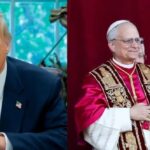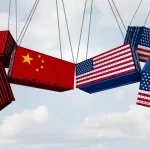Pope Leo XIV, the first pontiff born in the United States, described his election as both a profound responsibility and a blessing during his inaugural Mass as head of the Catholic Church.
Speaking in English during the service in the Sistine Chapel, the new pope thanked the cardinals who selected him to succeed Pope Francis. Without a prepared text, he reflected on the challenges and hope tied to his new mission, urging the Church to continue spreading the Gospel with joy, even in a world that often dismisses faith.
“You have called me to carry that cross and to be blessed with that mission,” he said, “and I know I can rely on each and every one of you to walk with me as we continue as a church, as a community, as friends of Jesus, as believers, to announce the good news.”
Elected the 267th pope on Thursday, Leo, formerly Cardinal Robert Prevost of Chicago, takes the helm of the global Church at a time of significant social and spiritual transformation. His election breaks a long-standing unwritten rule against American popes due to the United States’ geopolitical influence.
The Vatican has announced that Pope Leo XIV’s formal installation Mass will take place on May 18, and his first general audience is scheduled for May 21. For now, he has asked all Vatican office heads to remain in their roles pending further discernment and consultation.
During Friday’s Mass, two women read from Scripture — a choice many see as a signal that Leo intends to continue Pope Francis’ initiatives toward increasing women’s participation in Church leadership. As a cardinal, Leo had already implemented one of Francis’ major reforms by appointing women to the Vatican committee that evaluates bishop nominations.
Speaking later in Italian, the pope criticized how Christian faith is often marginalized in modern society, noting that even among the baptized, many live as though God does not exist. He described this spiritual emptiness as a root cause of societal issues like the breakdown of families and loss of human dignity.
Applause broke out after the Mass. Leo, like his predecessor, chose to wear simple black shoes instead of the traditional red footwear favored by more conservative popes.
Pope Francis had long seen Leo as a trusted figure. After years serving in Peru as a missionary, Leo was brought to Rome in 2023 to lead the Vatican’s Dicastery for Bishops — a vital office responsible for evaluating episcopal appointments worldwide.
Though he maintained a low public profile in Rome, Leo earned the respect of many within the Church. His leadership in reforming bishop selection and inclusion of lay voices reflected key elements of Francis’ papacy. In a past interview, Leo spoke of the need to overcome division and promote unity within the Church.
“He is continuing a lot of Francis’ ministry,” said Natalia Imperatori-Lee, a theologian based in New York, who noted that Leo’s election could shift perceptions of American Catholicism globally, especially in a Church often divided along ideological lines.
Leo’s choice of papal name also carries historical weight. He is the first pope to take the name Leo since Leo XIII, who served from 1878 to 1903 and is remembered for his teachings on social justice, workers’ rights, and modern society’s challenges. The new pope’s connection to the Augustinian order — and Leo XIII’s affinity with it — further suggests a link in vision and spiritual heritage.
His brother, John Prevost, said the family was stunned by the news of his election. He described Pope Leo as someone who is deeply compassionate, focused on the poor, and avoids ideological extremes. “He’s not going to be real far left and he’s not going to be real far right,” he said. “Kind of right down the middle.”
In the hours after his election, Pope Leo visited his old apartment and prayed privately in the Pauline Chapel before greeting the world from St. Peter’s Basilica. His first Sunday blessing is set for this weekend, and he plans to meet with members of the media on Monday.
Looking ahead, Pope Leo may soon embark on his first international trip. The late Pope Francis had accepted an invitation to visit Turkey to mark the 1,700th anniversary of the First Council of Nicaea — a milestone event in Christian history and ecumenical dialogue — and Leo could take up that journey as one of his first acts on the global stage.



